ASUS Zenfone 6 review: An absolute steal
Mục Lục
Asus Zenfone 6
The ASUS Zenfone 6 offers incredible value at just $499. If you want 90 percent of a flagship for 50 percent of the price, this is the phone to beat.
This device is no longer widely available. The ASUS Zenfone 6 is now unavailable to buy from most retailers. If you are looking for an alternative device, check out our list of the
The ASUS Zenfone 6 is now unavailable to buy from most retailers. If you are looking for an alternative device, check out our list of the best Android phones you can buy
The first article I ever wrote was about the launch of the ASUS Zenfone 2. It had an incredible 4GB of RAM and cost just $299 — an absolutely insane price at the time for that much memory!
Four years later, ASUS has preserved this heritage of flagship specs at a mid-range price. While other manufacturers have started charging more than $1,000 for their devices, ASUS has managed to keep its prices low while offering some of the best hardware on the market.
This is Android Authority’s ASUS Zenfone 6 review.
About this review: While writing this review, I used an ASUS Zenfone 6 supplied by the manufacturer over a period of 11 days in the U.S. and Taiwan. I used the Black model with 8GB of RAM and 256GB of storage, running ZenUI 6 on the April 1st, 2019 security patch.
ASUS Zenfone 6 review: The big picture
The ASUS Zenfone 6, also known as the ASUS 6Z in India, is the company’s latest affordable flagship. It doesn’t sport quite as aggressive a look as the gamer-focused ASUS ROG phone, but it still looks premium enough to get attention from a wide variety of people.
If a headphone jack, Qualcomm Snapdragon 855 processor, 48MP flip camera, microSD card expansion, and dedicated quick actions button aren’t enough to get you interested in this device, maybe the price is. ASUS is offering this phone for just $499, seating it firmly between the Pixel 3a and OnePlus 7 Pro. In a way, it offers the best of both worlds.
ASUS managed to marry flagship specs with mid-ranged pricing.
There are a couple of features missing from this device that may annoy a few consumers, but I personally felt they were fine to omit at this price point. Wireless charging and water resistance are the big offenders, but most mid-range devices don’t have these features so I give it a pass.
What’s in the box
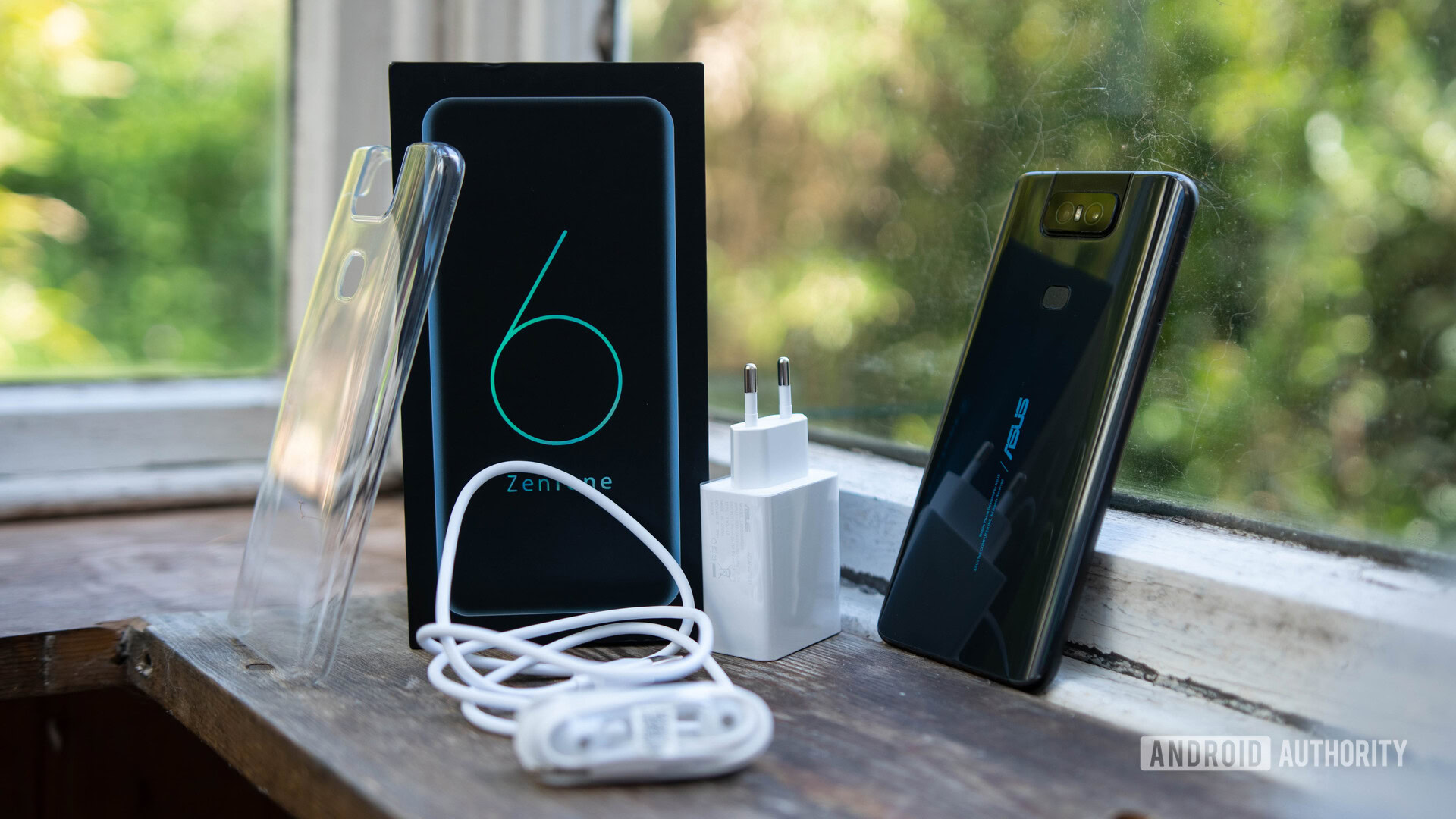
- 18W charging brick
- White USB-A to USB-C cable
- Clear protective case
- ASUS earphones
The ASUS Zenfone 6 comes with an 18W charging brick, a USB-A to USB-C cable, a pair of white ASUS earbuds, and a soft protective case. The case has a cutout near the back for the new flip-up camera. The earbuds are tuned by 1MORE and actually sound decent. If you want to take better advantage of the headphone jack though, you can get even better audio quality for just a bit of extra cash.
Design
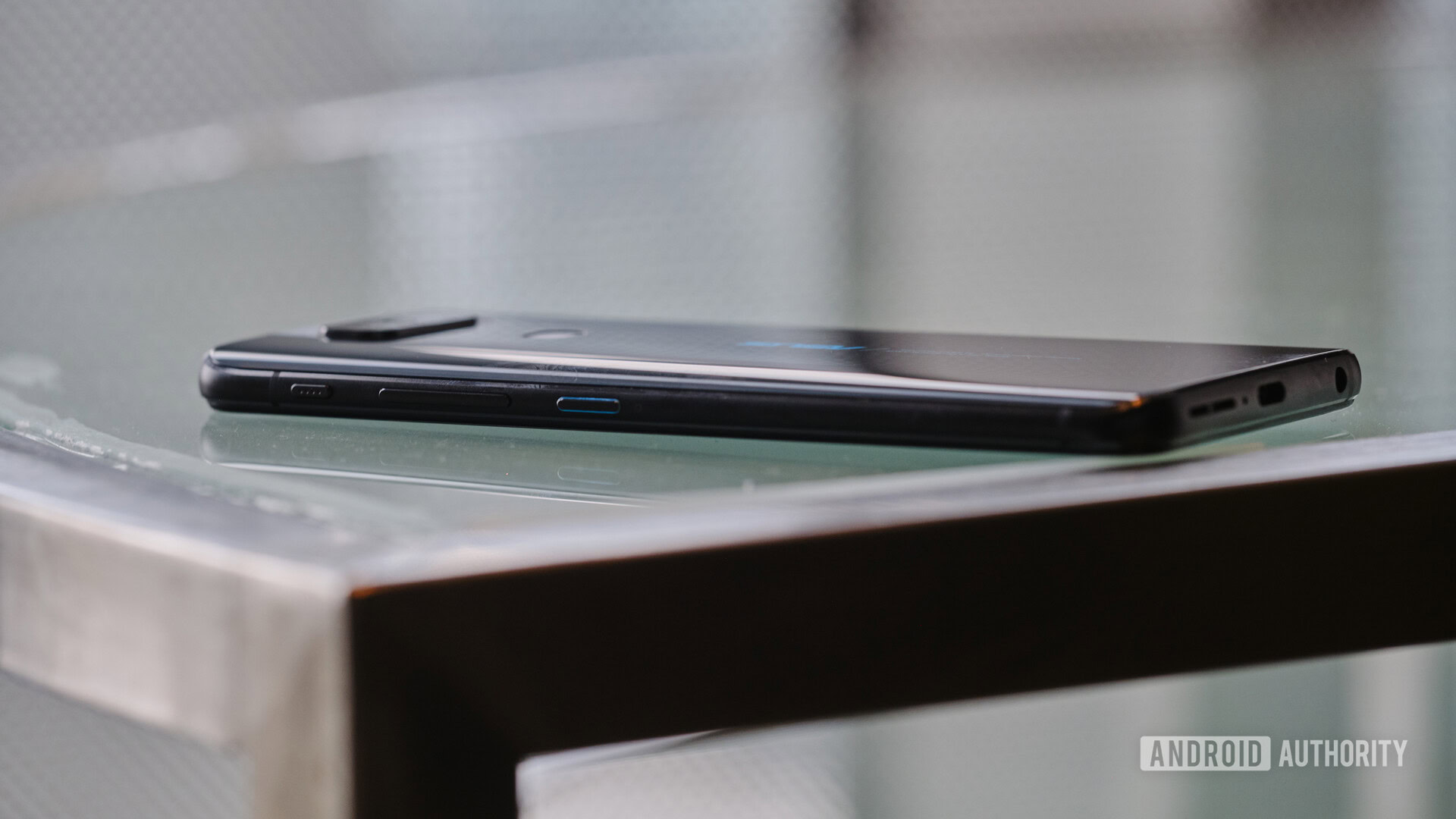
- 190g
- 159.1 x 75.44 x 9.1mm
- No notch
- Ambient light sensor
- Dual-SIM tray
- Headphone jack
- Flip-up camera
- Quick actions button
- Rear-mounted fingerprint reader
- MicroSD card slot
The Zenfone 6 has a clean design that will appeal to most any consumer. It’s not nearly as gamer-focused as the ROG phone from ASUS, but the robotic-looking flip camera and blue accents give it a slightly more aggressive look than phones like the Pixel 3.
The body of this device is made of Gorilla Glass, and it sports an aluminum frame around the rim. It feels hefty and premium in the hand, so much so that at first I thought it was actually made wholly of metal. Unfortunately, there is no wireless charging in this device, so it may as well have been made of metal.
This phone comes with a healthy number of ports and buttons. On the right side of the device, you’ll find a power button with a nice blue accent to match the ASUS logo on the back, volume rockers, and a dedicated quick action button. This button defaults to Google Assistant, but you can change it to do a number of things like take a screenshot, open the camera, or change the sound mode.
Customizable buttons will always be met with praise from us here at AA.
There aren’t any physical buttons on the left side of the phone, but you will find a dual-SIM tray with a slot for expandable storage. The bottom of the device houses a headphone jack, USB-C port, and a speaker grill.
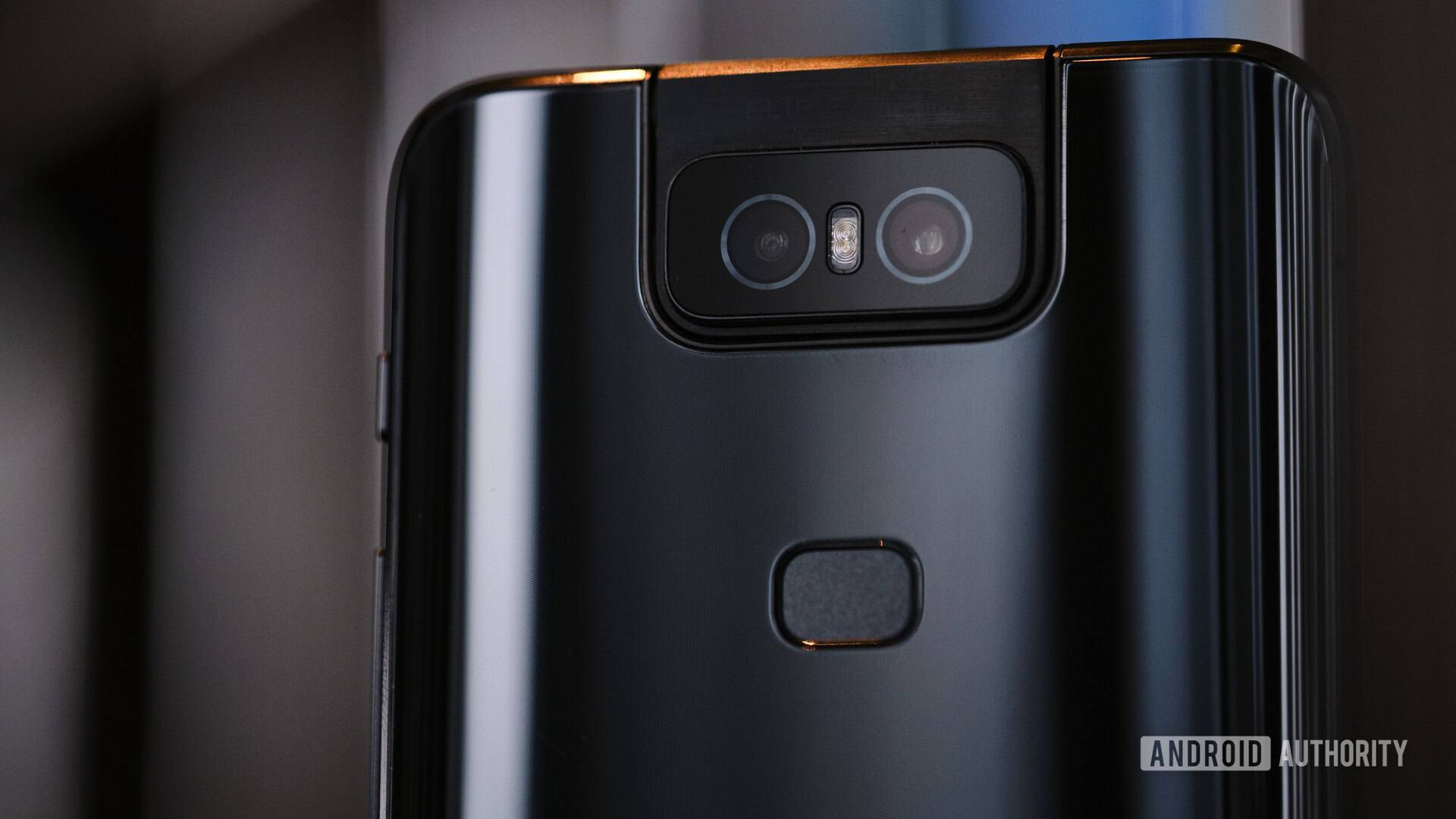
The back of the phone houses a rear-mounted fingerprint reader and a dual camera array. This camera system is one of the highlights of the device. It physically flips around the top of the phone, which allowed ASUS to keep the screen free of cutouts and notches. We’ll get more into this later, but just know this unique camera array is sure to turn some heads.
This device does not have an official IP rating for water and dust resistance, but that’s not surprising. Any phone with moving parts is extremely hard to make water resistant, and the flip-up camera on the Zenfone 6 is its Achilles’ heel in this case.
Display
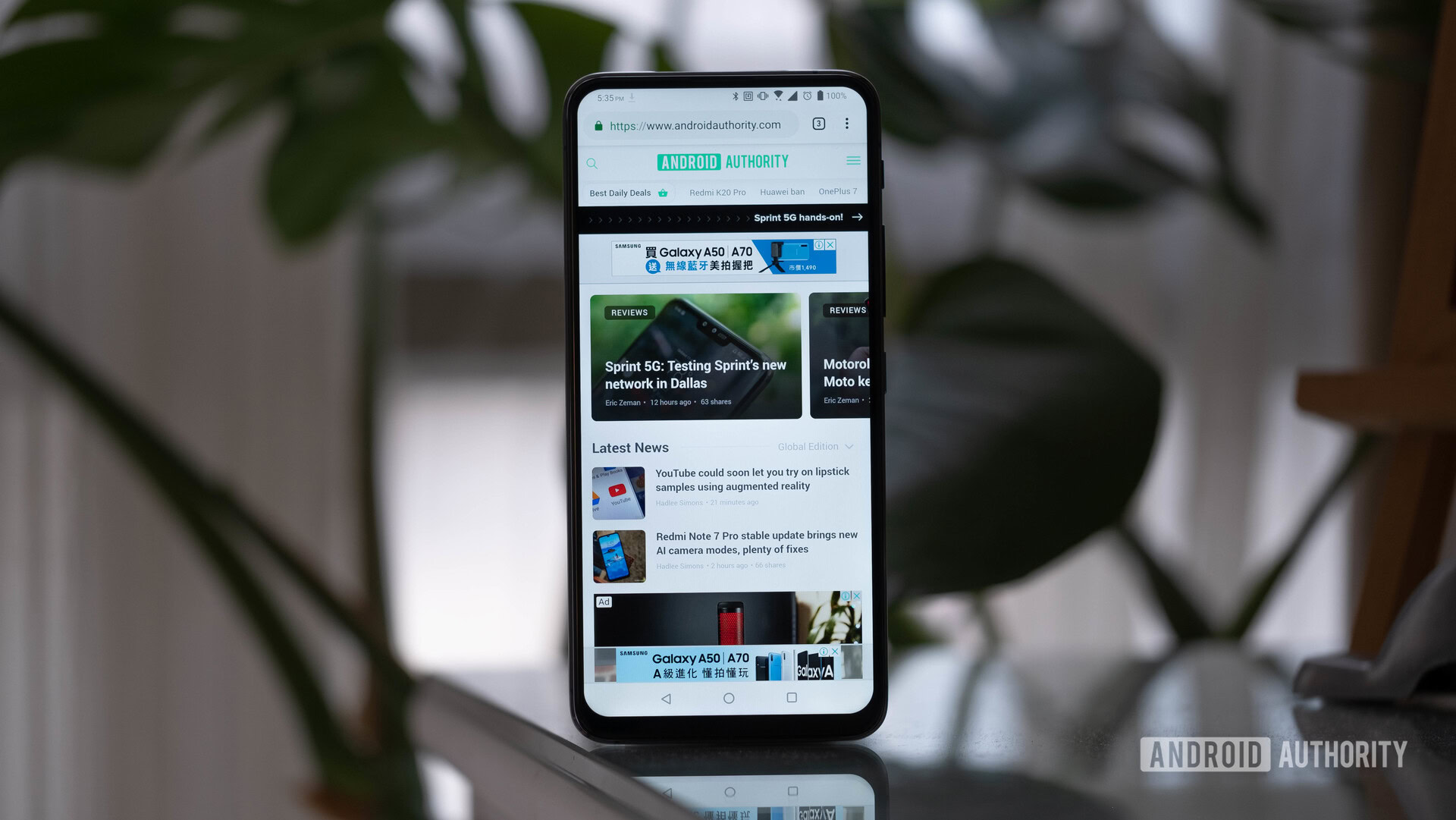
- 6.4-inch IPS LCD display
- 2,340 x 1,080 resolution, 403ppi
- 19.5:9 aspect ratio
- Gorilla Glass 6
Probably the most glaring issue with the ASUS Zenfone 6 is its LCD display. Most high-end smartphones (and even some mid-ranged ones) use OLED panels for deeper blacks, better battery life, and features like always-on display. While an OLED display allows individual pixels to be illuminated, LCD technology requires the entire display to be lit, draining more battery and reducing dynamic range.
I sorely missed OLED while using this device.
The other issue with this display is brightness. It maxes out at 600 nits, and I had to keep the Zenfone 6 on maximum brightness throughout my time with it. It’s difficult to see the screen outdoors, and I usually only have to keep my phones at around half brightness on a daily basis.
Those things considered, the quality of this panel is very good, in multiple respects. It has 100 percent DCP-I3 coverage, meaning it can show that entire color space, and the panel is made of Gorilla Glass 6. It should be more shatter resistant than phones with older Gorilla Glass versions.
The display isn’t obstructed by any sort of notch. This phone uses a flip-up camera and the result is a full-screen display. There is still a noticeable chin at the bottom of the display, but it’s not as big as the chin on the Pixel 3.
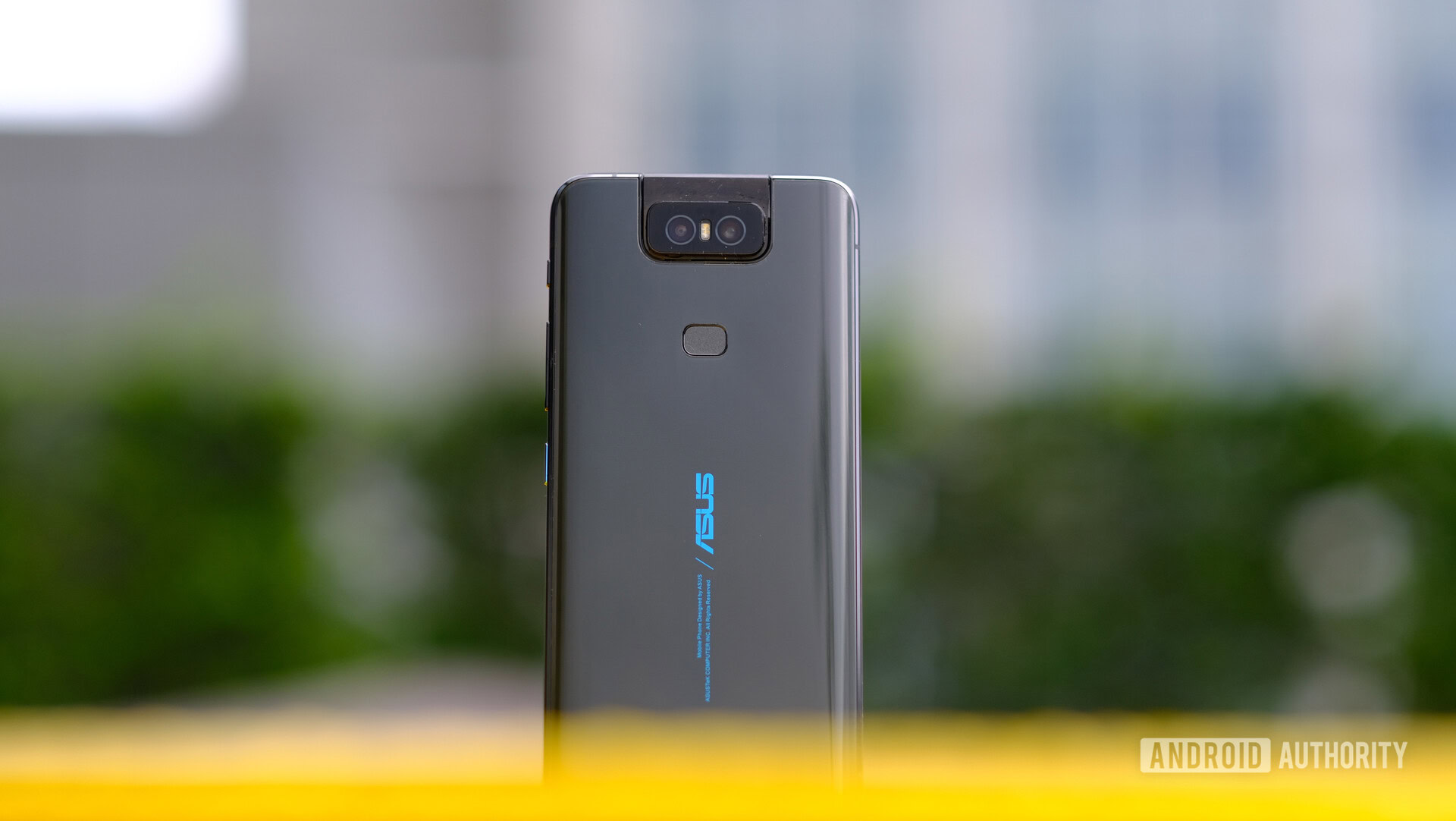
Performance
- Qualcomm Snapdragon 855
- Octa-core
- Adreno 640 GPU
- 6GB or 8GB of RAM
- 64GB or 256GB of storage
- MicroSD expandable storage
Given the specs the Zenfone 6 is sporting, it’s no surprise that it absolutely flies. I saw no stuttering or lag during my time with the device. The lightweight software experience helps keep the device feeling fast, and the 6GB or 8GB of RAM allows you to multitask without forcing any apps out of memory.
This phone gets hot under a heavy load. While running benchmarks, the Zenfone 6 got warmer than most glass-back devices, and it even stopped charging due to overheating. Gaming would likely get this phone quite hot, so you may want to take a break every now and then.
The ASUS Zenfone 6 did very well in benchmarks. In AnTuTu, it scores around 370,000 points, even beating out the Samsung Galaxy S10 Plus. 3DMark saw a slightly lower score than the S10 Plus at around 5,500 points, and Geekbench 4 gave the Zenfone the slightest edge over the S10 in single-core performance, while just barely falling behind in the multi-core test.
If you really want the best performance, you can enable AI Boost Mode, though I don’t recommend it. This will drain the battery even faster than it already does.
Battery
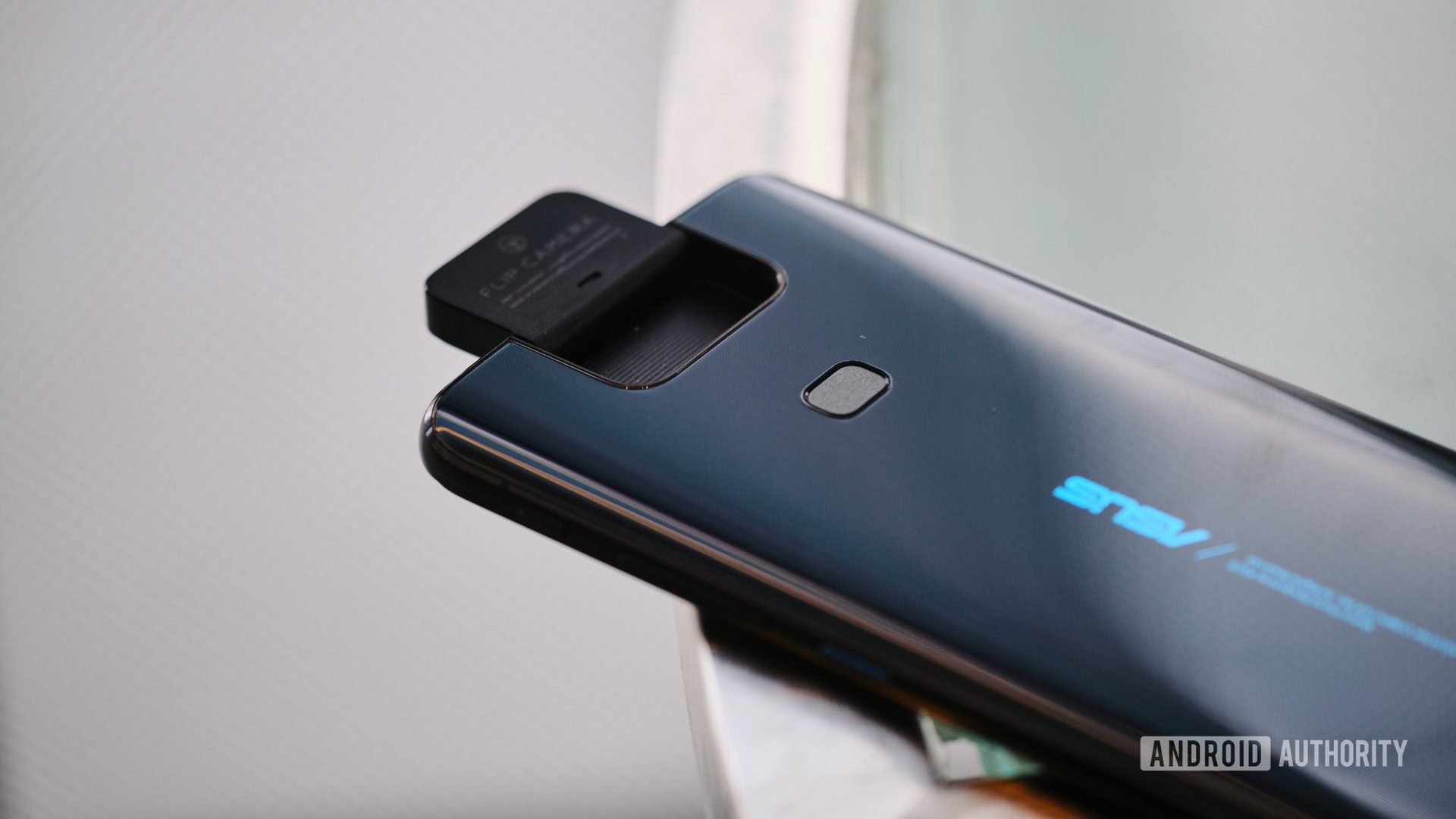
- 5,000mAh
- Qualcomm Quick charge 4.0 (18W)
- No wireless charging
Despite the 5,000mAh battery, the battery life of the Zenfone 6 was no more than average. I notched about six and a half hours of screen-on time, which is decent, but compared to the Samsung Galaxy S10 Plus or HUAWEI P30 Pro this seemed a bit low. I was able to make it to the end of the day on one charge, but you likely won’t get two full days as we saw on the HUAWEI P30 Pro.
A big issue with this phone seems to be a high-level of standby drain. I went to bed one night with 26 percent remaining and woke up to a dead device. Most phones have fairly good standby battery life, so it’s a bit strange to see this device drain so fast. The Zenfone 6 also takes a while to charge up. It supports 18W wired charging, but the sheer capacity of the battery makes it take longer to top up than most devices. I’d like to see ASUS develop its own quick charge technology, especially when using a battery this large.
Camera
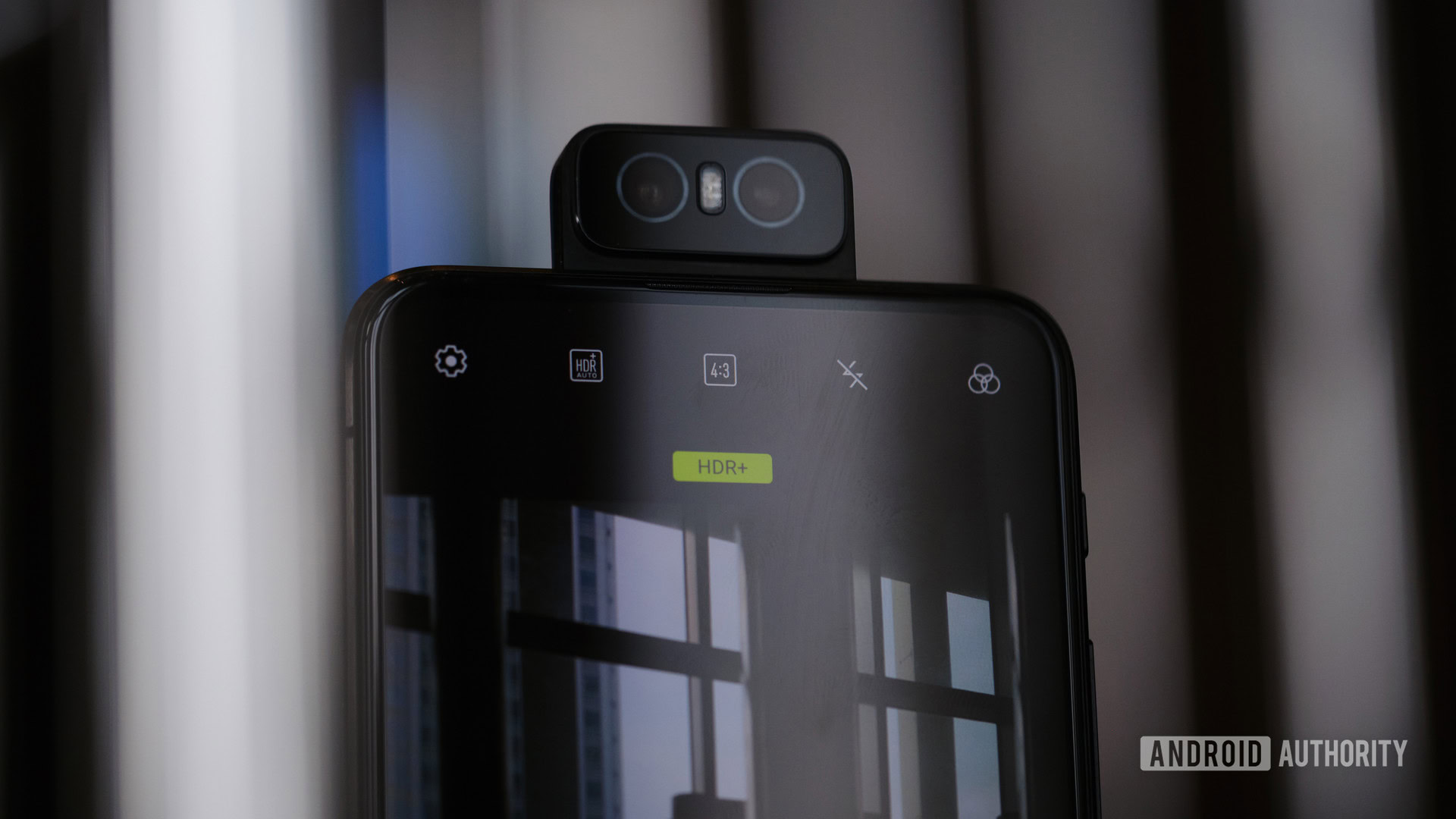
- Flip camera
- Standard: 48MP, f/1.79
- Wide: 13MP ultra-wide
- Pixel-binned images at 12MP
We should note that a software update was recently released that is meant to update the camera performance. Unfortunately, our unit was unable to install the update for an unknown reason. We’re currently trying to resolve this and will update our Zenfone 6 review with new images once this is fixed.
The ASUS Zenfone 6 is using the 48MP Sony IMX586 sensor for the primary camera, and a 13MP sensor for the wide-angle camera. This isn’t unique for devices this year — nearly every high-end smartphone has leaned on this high-res sensor to get sharp images. The truly unique part about this camera is how it doubles as a selfie shooter.
Most manufacturers use either a pop-up camera or punch hole design to achieve a full-screen display, but ASUS thought outside the box and developed a camera that physically flips around the top of the phone. This brings the flexibility of the 48MP and wide-angle rear shooters face-to-face with the owner for maximum selfies.
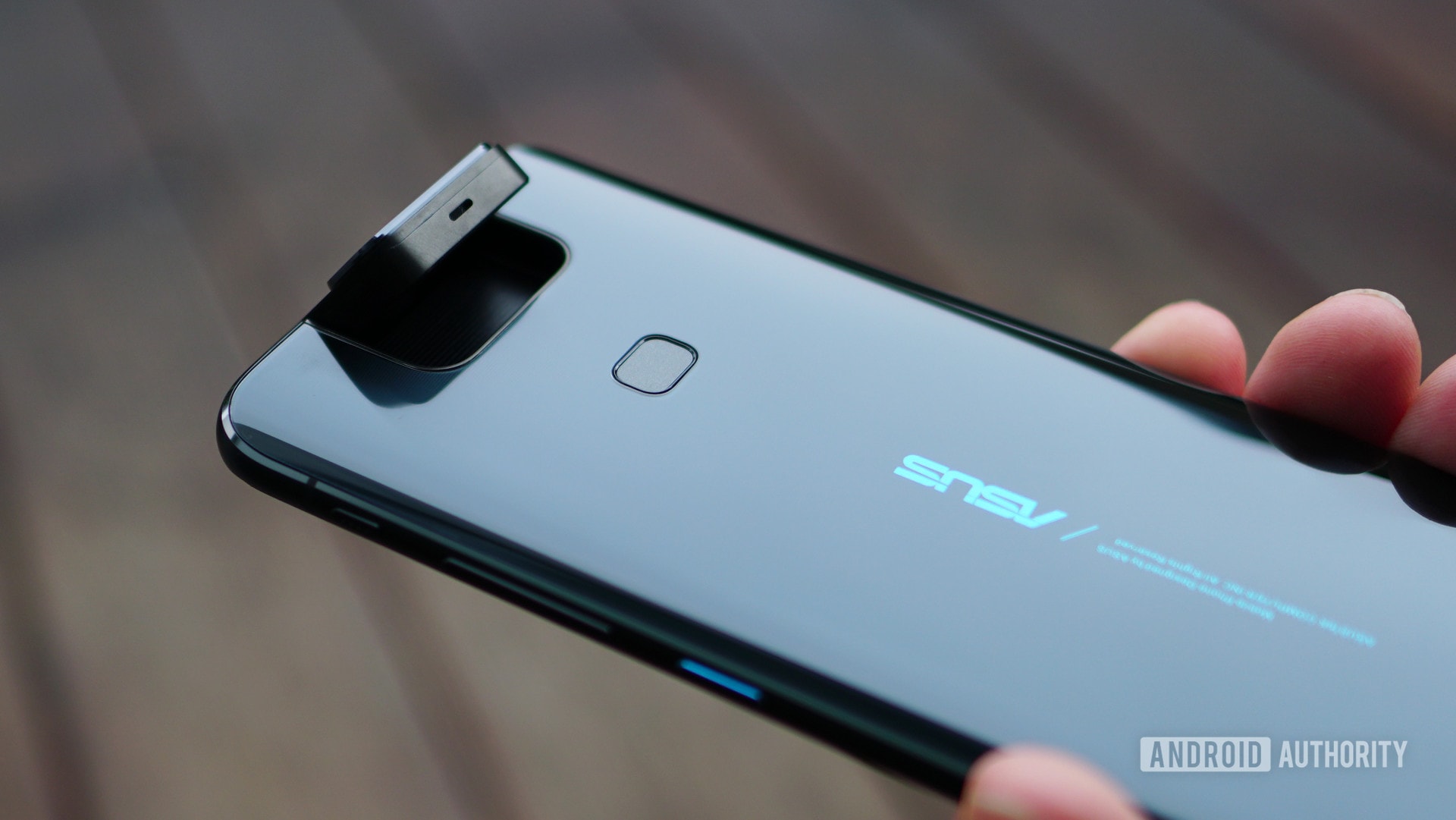
The flip-up camera can swing around a full 180 degrees, allowing you to take images at any angle in-between. While this might not seem that useful, it enables a couple of interesting features like automatic panorama mode or object tracking. The former allows the user to stand still while the phone takes a panorama image, and the latter uses contrast-detect object tracking to swivel the camera and follow a subject around a scene. While not everyone will use these features, they’re pretty cool to have regardless.
In terms of actual image quality, the Zenfone 6 performs admirably. Dynamic range is solid but not too washed out, and sharpness is quite good. It doesn’t seem like ASUS put that much effort into tuning this camera, but sometimes that’s a good thing. I’d prefer a more muted image to something oversaturated or oversharpened.

That being said, this phone seemed to have an issue with brighter reds. In the image of flowers above, you can see the device had trouble processing the red channel. It’s possible this will be fixed in an upcoming software update, but we wouldn’t hold our breath.
Low-light images were quite good and didn’t show as much noise as we anticipated. The device struggled in more extreme low-light situations, but its long-exposure mode helped get more light out of a dark scene.
Portrait mode on this phone is also very good. The Zenfone 6 does a great job of removing the subject from the background, while still retaining a natural look t the blurred background. I did notice a bit too much skin smoothing on portrait mode photos, but it’s not horrible.
Software
- ZenUI 6
- Android 10
UPDATE: MArch 20, 2020 (3:00PM ET): The ASUS Zenfone 6 has been updated to Android 10 and is currently on the February security patch. Since I no longer have the device I can’t comment on the quality of ASUS’ Android 10 implementation, but it’s nice to see the software continuously updated.
The ASUS Zenfone 6 runs ZenUI 6, which is a complete refresh from its previously terrible software. The new skin is lightweight, with only a few software additions on top of “stock” Android 9 Pie.
ASUS has included a dedicated screen recorder, AI Boost for intense usage sessions, and even an FM Radio. The only questionable app you’ll find on this phone at startup is the ASUS Data Transfer app, which is still useful for when you want to move data between devices.
Overall we’re really glad to see the switch to a simpler interface. ASUS devices have previously been stacked with apps and services no one uses, so it’s nice to see a UI that gives the user more control over what’s on their device.
Audio
- 3.5mm headphone jack
- NXP TFA9874 smart amp
- Dual speakers
The ASUS Zenfone 6 features a dual-speaker setup. There is one speaker in the bottom edge of the phone and another doubling as an earpiece in the top bezel. The speakers sound decent but lack bass like many smartphones currently in the market.
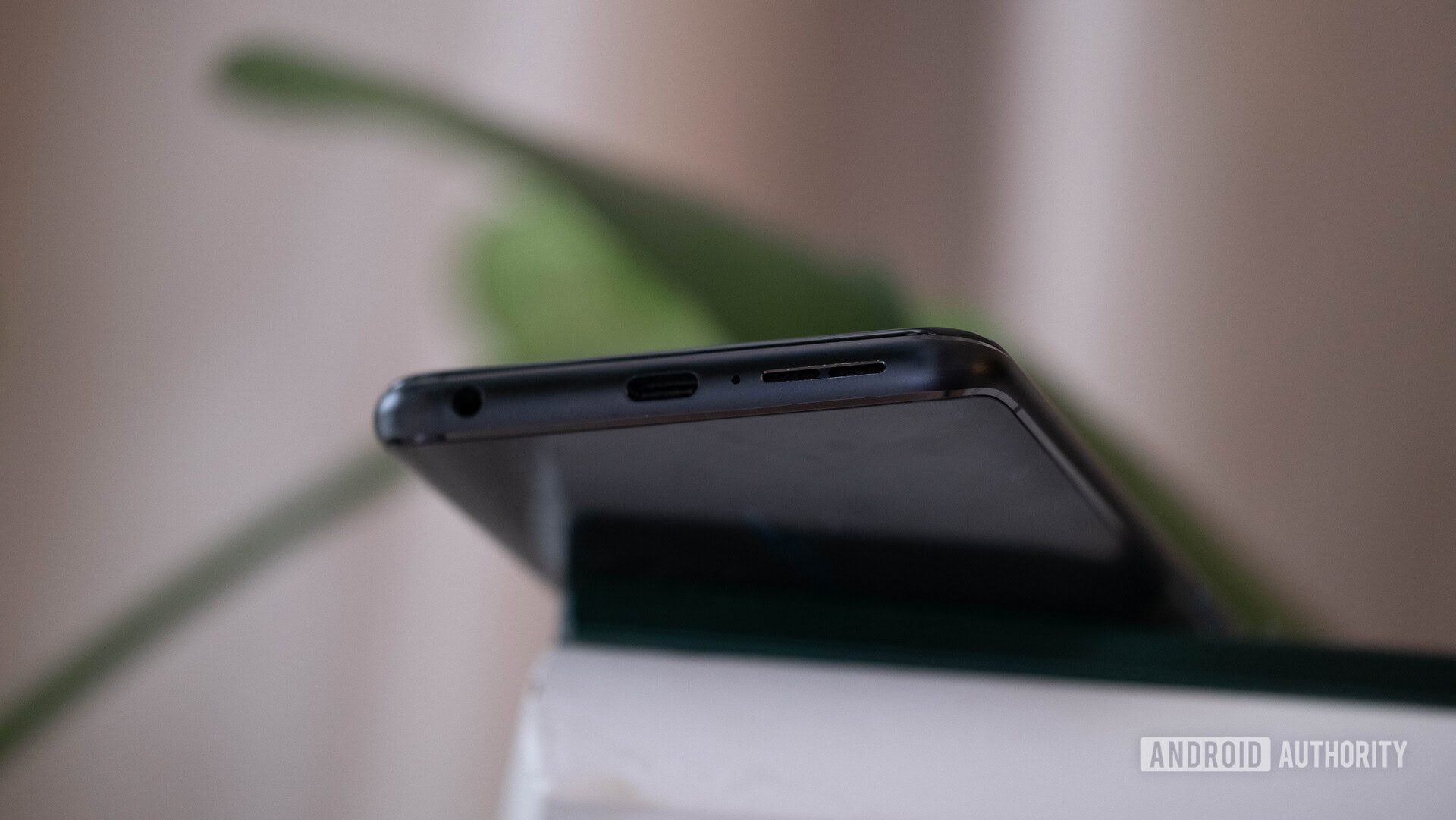
The phone is using a smart amplifier, which is supposed to keep the sound from getting distorted at high volumes. This is mostly true. While other devices get tinny past a certain volume, the Zenfone 6 sounds relatively clear. If you have the phone upside down though, the camera will start to rattle around the 50 percent volume mark. If you’re listening to music we’d suggest keeping the phone face up.
The headphone jack is a nice surprise.
Quite surprisingly, this device includes a headphone jack. Many manufacturers have moved away from wired audio, but ASUS has embraced it in its last few handsets. Audio quality from a headphone jack will always be superior to Bluetooth, and the flexibility of analog audio is also appreciated.
If you prefer to go wireless, the ASUS Zenfone 6 supports Bluetooth 5 with the high fidelity aptX HD, LDAC, and HWA codecs.
To take full advantage of the wide range of audio options from this device, make sure you check out the Best Headphones of 2019 list over at SoundGuys.
ASUS Zenfone 6 specs
ASUS Zenfone 6
Display
6.4-inch IPS LCD
FHD+ resolution
19.5:9 ratio
Corning Gorilla Glass 6
Processor
Qualcomm Snapdragon 855
GPU
Qualcomm Adreno 640
RAM
6GB / 8GB
LPDDR4X
Storage
64GB / 256GB
UFS 2.1
Expandable with microSD card (up to 2TB)
Battery
5,000mAh battery
Quick Charge 4.0 at 18W
Cameras
Primary:
48MP Sony IMX586 sensor
f/1.79 aperture
0.8μm / 1.6μm pixels
1/20-inch
Dual LED flash
4K 60fps video with EIS (front and back)
Secondary:
13MP ultra-wide sensor
Connectivity
802.11a/b/g/n/ac
2x2MIMO
Bluetooth 5.0
NFC
GPS (Dual bands, L1+L5)
GLONASS(L1)
BDS(B1)
GALILEO (Dual bands, E1+E5a)
QZSS (Dual bands, L1+L5)
SIM
Dual nano-SIM
MicroSD card (up to 2TB)
Operating System
Android 9 Pie
Audio
Dual speakers
NXP TFA9874 smart amp
Bundled earphones
3.5mm headphone jack
Dimensions
159.1 x 75.44 x 9.1mm (largest model)
190g
Colors
Midnight Black, Twilight Silver
Corning Gorilla Glass 3 for back glass
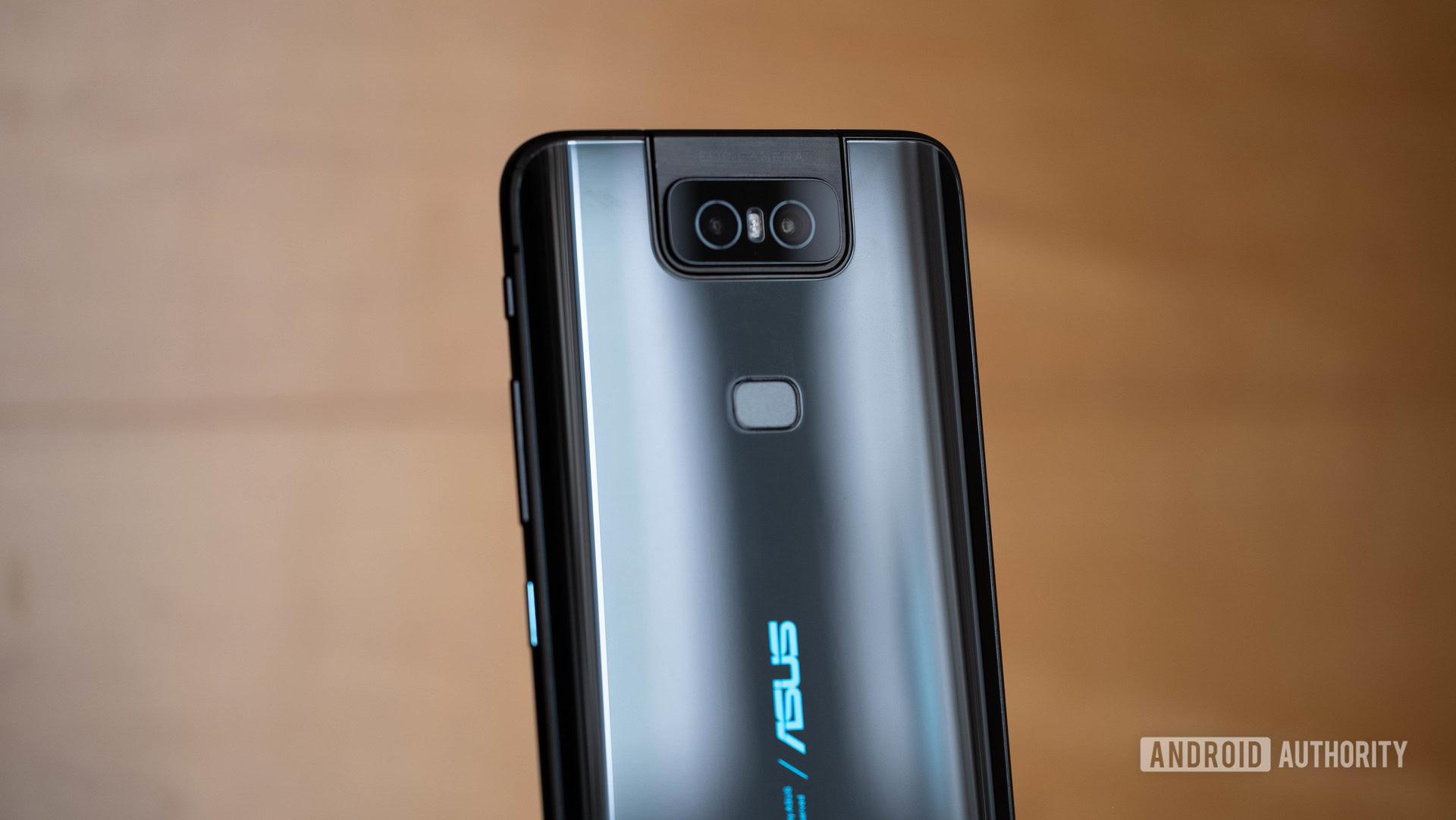
Value for money
- ASUS Zenfone 6: 6GB RAM, 64GB ROM — 499 euro / $499 / 31,999 rupees
- ASUS Zenfone 6: 6GB RAM, 128GB ROM — 559 euro / 34,999 rupees
- ASUS Zenfone 6: 8GB RAM, 256GB ROM — 599 euro / 39,999 rupees
Starting at just 499 euro, the ASUS Zenfone 6 is an aggressively priced device. It undercuts the base model OnePlus 7 Pro by 200 euro with nearly the same core specs — and it includes a headphone jack to boot.
Conversely, the OnePlus 7 Pro includes a bigger, better display, an arguably better UI, faster storage, and a telephoto lens. If you prefer wired audio, wide-angle selfies, expandable storage, and a dedicated quick action button, though, it’s hard to beat the Zenfone 6.
This phone sits firmly between the Pixel 3a and OnePlus 7 Pro.
If you want to spend a little less, you can get the Google Pixel 3a for $399. The 3a beats out the Zenfone in display quality and image quality, but the user interfaces are very similar, and the quick actions button on the Zenfone 6 is arguably more versatile than the Pixel 3a’s Active Edge. For the extra $100 you’re also getting expandable storage, a glass build, and a bigger battery.

While the base model Zenfone 6 is officially priced at $499, ASUS has declined to disclose U.S. pricing for the higher-tier models. If you’re in Europe, you can get 6GB of RAM and 128GB of storage for 559 euro, or 8GB of RAM and 256GB of storage for 599 euro.
Just this week, ASUS also announced a special 30th-anniversary Zenfone 6, packed with 12GB of RAM, 512GB storage, and a 30-month warranty. We don’t know any pricing details on this device, but it will no doubt be very expensive.
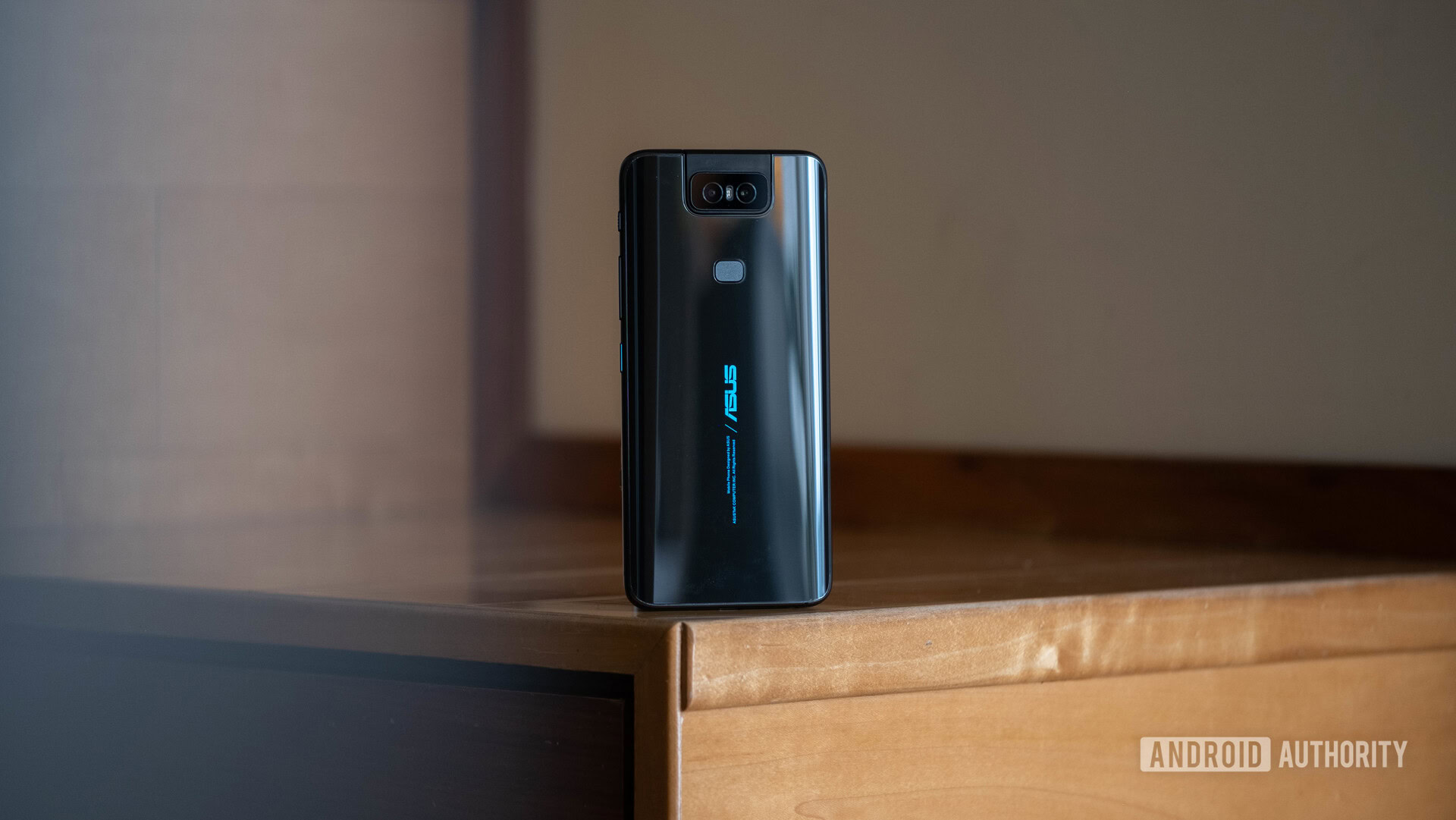
ASUS Zenfone 6 review: The verdict
For $499, the ASUS Zenfone 6 is an absolute steal. Many flagships costing $1,000 or more don’t offer the number of features found in the Zenfone 6. Moreover, the new user interface makes this phone a joy to use.
The Zenfone 6 may not have wireless charging or an official water resistance certification, but it does have many things that people care about, and even more features power users will appreciate. The headphone jack, expandable storage, notification LED, and quick actions toggle are all nice extras. These features sit on a strong foundation set by the Snapdragon 855 processor and healthy dose of RAM. It’s hard not to recommend this device at the price.
The ASUS Zenfone 6Z is known as the ASUS 6Z in India. The phone goes on sale on June 26 with prices starting at 31,999 rupees (~$460) for the base variant with 6GB RAM and 64GB of storage. Prices go all the way to 39,999 rupees (~$575) for the top-end version with 8GB RAM and 256GB of storage. The ASUS 6Z will be sold via Flipkart in India.
That’s all for our ASUS Zenfone 6 review. Are you interested in buying one? Let us know down below!
Zenfone 7: Coming soon?
It’s been nearly a full year since this review was originally published, which means the Zenfone 7 is most likely on the horizon. But what will ASUS add? Make sure you check out our article on what we’d like to see in this device!






